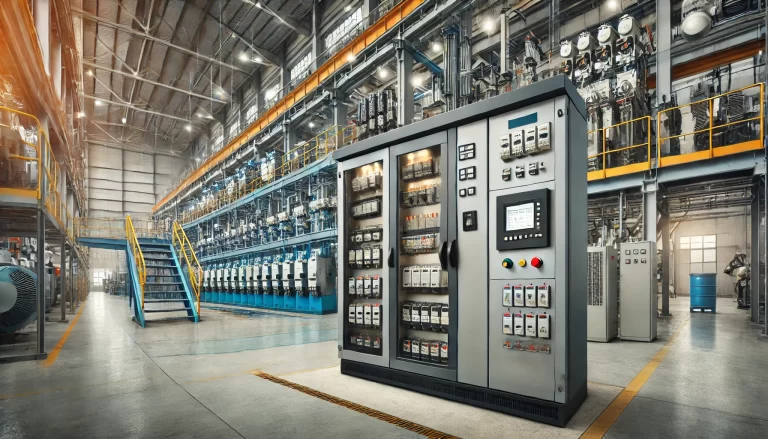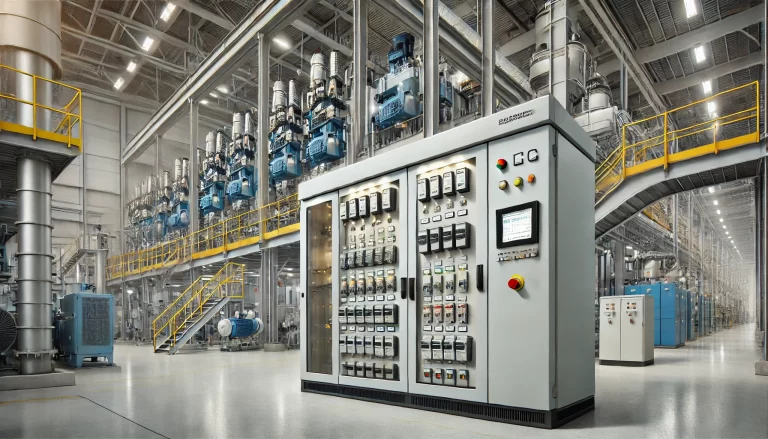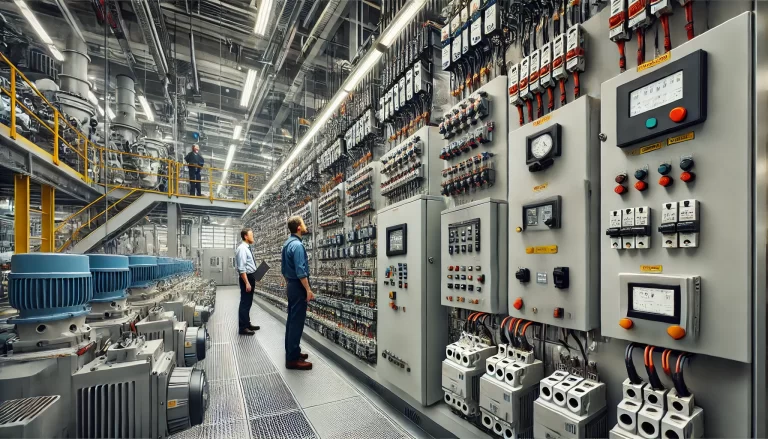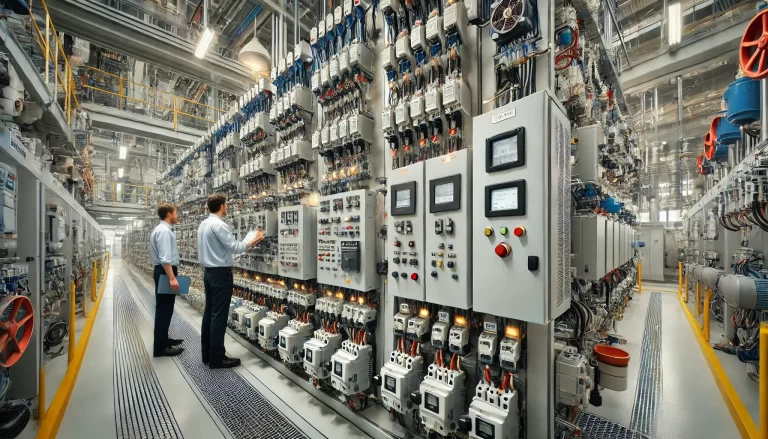Introduction
In modern industrial automation, managing multiple electric motors efficiently and safely is a significant challenge. A Motor Control Center (MCC) is a crucial solution designed to centralize and streamline motor management. Widely used in industries such as oil & gas, metallurgy, mining, water treatment, and power generation, MCCs play an essential role in motor control, protection, and monitoring.
This article provides an in-depth exploration of MCCs, covering their components, working principles, applications, advantages, and how they enhance industrial efficiency and safety.
What is an MCC?
An MCC is an integrated system used to control multiple electric motors in an industrial facility. It consists of modular compartments, each containing electrical control devices such as circuit breakers, contactors, variable frequency drives (VFDs), and protective relays. MCCs simplify motor management by providing a centralized control hub, allowing operators to start, stop, regulate speed, and protect motors efficiently.

Components of an MCC
An MCC typically consists of multiple functional modules. Here are the key components:
1. Switchgear (Power Distribution System)
Switchgear is a fundamental part of an MCC, responsible for controlling and distributing power. It includes:
Circuit Breakers – Automatically disconnect the power supply during overcurrent conditions.
Fuses – Provide overcurrent protection and prevent electrical faults from spreading.
2. Contactors (Motor Switching Devices)
Contactors control the on/off switching of electric motors remotely. They function as electromechanical relays that can handle high power loads safely.
3. Variable Frequency Drives (VFDs) (Speed Control Mechanism)
VFDs regulate the speed and torque of AC motors by adjusting the frequency and voltage supplied. They provide benefits such as:
Energy savings (reducing energy consumption by up to 30%)
Smooth acceleration and deceleration
Reduced mechanical stress on equipment
4. Soft Starters (Motor Starting Protection)
Soft starters gradually increase the voltage to a motor during startup, reducing sudden current spikes and mechanical stress. This prevents motor overheating and extends the lifespan of both the motor and connected equipment.
5. Protective Devices (Ensuring System Safety)
These devices safeguard motors and electrical circuits from faults and damage. Key protections include:
Overload Protection – Prevents motors from drawing excessive current.
Short Circuit Protection – Cuts off power during unexpected short circuits.
Phase Loss Protection – Detects missing phases and prevents motor damage.
6. Control Panel (User Interface & Monitoring)
The control panel serves as the user interface for MCC operation. It typically includes:
Push Buttons – For manual motor control (start/stop functions).
Indicators & Displays – Provide real-time feedback on motor status, voltage, and fault conditions.
Programmable Logic Controllers (PLCs) – Automate and optimize motor operations.

How Does an MCC Work?
An MCC operates based on programmable logic controllers (PLCs) or relay-based control logic. The system monitors motor conditions and sends signals to control devices, such as contactors or VFDs, to execute motor actions (start, stop, speed adjustment, etc.).
Key Functions of an MCC:
Motor Start/Stop Control – Using buttons or remote signals to initiate or halt motor operations.
Speed Regulation – Adjusting motor speed via VFDs to match process requirements.
Fault Protection – Detecting overloads, short circuits, and other faults to automatically disconnect power when necessary.
Remote Monitoring & Alarms – Integrating with SCADA (Supervisory Control and Data Acquisition) systems for real-time data collection and remote fault notifications.
Applications of MCCs in Industrial Automation
MCCs are widely used across various industries to enhance process control, safety, and efficiency. Below are some key sectors where MCCs play a critical role:
1. Oil & Gas Industry
In refineries and petrochemical plants, MCCs control essential equipment such as pumps, compressors, and ventilation fans, ensuring uninterrupted operation.
2. Metallurgical Industry
MCCs manage furnace motors, conveyor belts, and extraction fans, optimizing production processes and reducing downtime in metal processing plants.
3. Mining Industry
Mining operations rely on MCCs for controlling hoists, conveyor belts, and ventilation systems, ensuring efficient material handling and worker safety.
4. Water Treatment & Environmental Protection
Water treatment plants use MCCs to regulate pumps, agitators, and filtration systems, enabling optimal water flow and pollution control.
5. Power Generation & Distribution
MCCs support substations and power plants by managing motor-driven generators, transformers, and cooling systems, ensuring stable energy distribution.

Advantages of Using MCCs
MCCs offer numerous benefits, making them essential in industrial automation. Key advantages include:
1. Centralized Motor Management
MCCs consolidate motor control functions into a single unit, reducing the complexity of managing multiple motors individually.
2. Enhanced Safety Features
With advanced protective devices, MCCs reduce risks of electrical faults, fires, and motor failures, ensuring both personnel and equipment safety.
3. Energy Efficiency & Cost Savings
MCCs equipped with VFDs and soft starters significantly reduce power consumption and extend motor lifespan, cutting operational costs.
4. Scalability & Flexibility
MCCs can be customized with various modules to adapt to different industrial needs, providing scalability for future expansions.
5. Improved System Reliability & Maintenance
Real-time monitoring and diagnostics allow for predictive maintenance, minimizing downtime and preventing unexpected failures.
Future Trends in MCC Technology
With the rise of Industry 4.0, MCCs are evolving to incorporate smart automation and IoT-based monitoring. Key future trends include:
Integration with AI & Machine Learning – Predictive maintenance using AI-driven analytics.
Wireless & Remote Access – Cloud-based MCC monitoring for real-time control from anywhere.
Increased Cybersecurity – Protecting industrial networks from cyber threats as MCCs become more connected.

Conclusion
Motor Control Centers (MCCs) are indispensable in industrial automation, providing centralized, efficient, and secure motor management. By integrating advanced control, monitoring, and protection features, MCCs improve safety, efficiency, and reliability in diverse applications.
As industries continue to embrace digital transformation and smart automation, the evolution of MCCs will further enhance their role in optimizing industrial operations. Whether in oil & gas, metallurgy, mining, water treatment, or power generation, MCCs remain a cornerstone of modern industrial efficiency.
